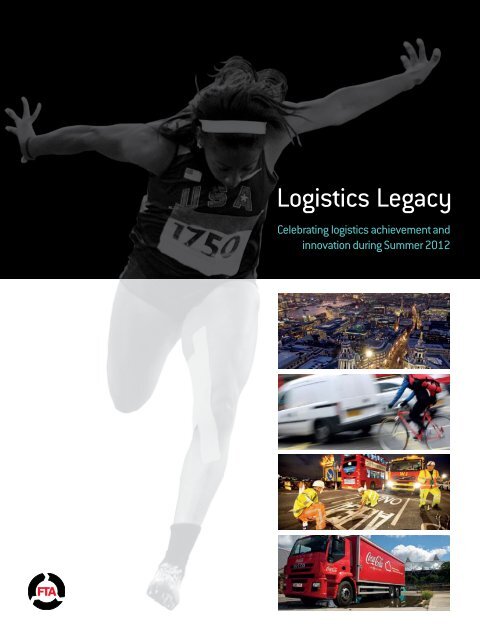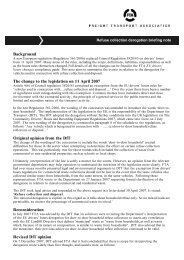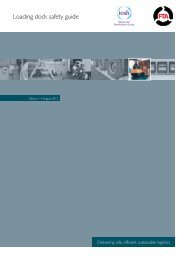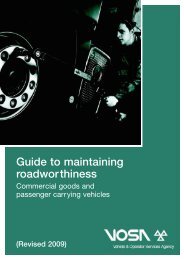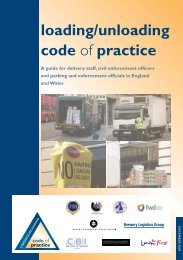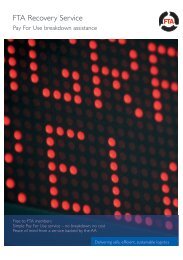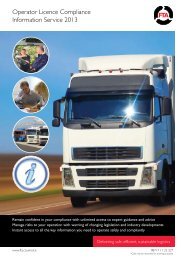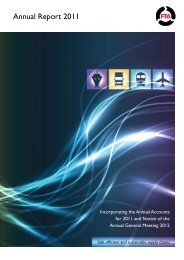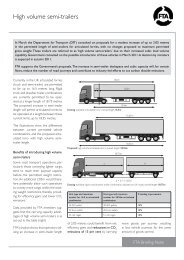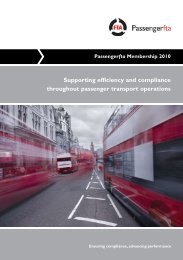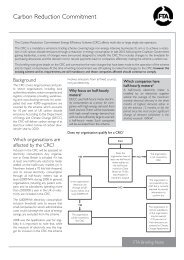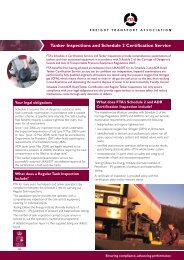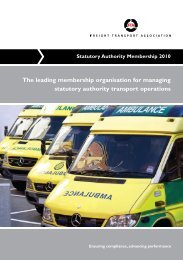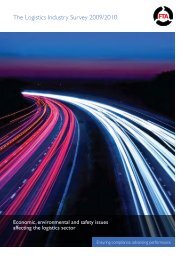Logistics Legacy â Olympics - Freight Transport Association
Logistics Legacy â Olympics - Freight Transport Association
Logistics Legacy â Olympics - Freight Transport Association
Create successful ePaper yourself
Turn your PDF publications into a flip-book with our unique Google optimized e-Paper software.
<strong>Logistics</strong> <strong>Legacy</strong><br />
Celebrating logistics achievement and<br />
innovation during Summer 2012
2 Foreword<br />
Foreword<br />
The staging of the Olympic and Paralympic Games in London during the<br />
summer of 2012 presented challenges of huge complexity and uncertainty for<br />
everyone involved in supplying and servicing the city.<br />
For over a year before the Opening Ceremony FTA and TfL worked closely<br />
together to provide logistics operators with the information, support and<br />
updates to allow them to adapt flexibly to the needs of London businesses<br />
and residents during the Games period. This flexibility was enhanced by the<br />
extensive and very practical support of the Traffic Commissioners.<br />
The outstanding success of the London 2012 experience owes much to<br />
the meticulous advanced planning and commitment of numerous individuals<br />
across government and industry that ensured London’s supply chains<br />
delivered the goods and services required. This document is a celebration<br />
of that success and records the extent to which logistics operations can<br />
be adapted to meet the most demanding circumstances, where there is<br />
the will and co-operation between all the parties involved. In the event ,<br />
the sporting achievements were breathtaking and the public acclamation<br />
exceeded all expectations. In awarding medals for advance planning, real-time<br />
responsiveness and sheer determination to succeed, logistics can proudly<br />
take its place on the podium.<br />
Our secret weapon was the close collaboration between London<br />
government and London businesses – a feature repeatedly cited by the<br />
interviewees in <strong>Logistics</strong> <strong>Legacy</strong> and one that we are determined be preserved<br />
and developed as part of our legacy from the ‘Greatest Show on Earth’.<br />
Theo de Pencier, Chief Executive, <strong>Freight</strong> <strong>Transport</strong> <strong>Association</strong><br />
Peter Hendy CBE, Commissioner for <strong>Transport</strong>, <strong>Transport</strong> for London
The context<br />
3<br />
The logistics challenge<br />
<strong>Logistics</strong> <strong>Legacy</strong> is a record of<br />
innovation and achievement by some<br />
of the many, many organisations and<br />
individuals that were responsible for<br />
delivering to and servicing London<br />
during Summer 2012.<br />
The Olympic and Paralympic<br />
Games between them offered 11<br />
million tickets and many unticketed<br />
events. The busiest day was<br />
expected to draw crowds of over one<br />
million visitors. Athletes, their support<br />
teams and event staff numbered<br />
in the hundreds of thousands. The<br />
Olympic Route Network, which was<br />
designed to allow athletes, trainers,<br />
media and Games officials to travel to<br />
events unimpeded and on time, was<br />
some 109 miles long in London alone.<br />
This huge influx not only boosted<br />
demand for food, drink, waste<br />
collection, hotel laundry services<br />
and many other specialist services,<br />
but also required them to be<br />
delivered in the face of restrictions<br />
and congestion that no London<br />
companies had experienced before.<br />
In short, the capital had never<br />
seen an event like it.<br />
The safe and efficient functioning<br />
of London during Summer 2012<br />
was the subject of a massive<br />
communications and planning<br />
exercise by <strong>Transport</strong> for London,<br />
<strong>Freight</strong> <strong>Transport</strong> <strong>Association</strong><br />
and other trade bodies, that got<br />
underway nearly 18 months before<br />
the opening ceremony.<br />
The challenge was not only to<br />
supply the venues and other Games<br />
facilities themselves, a responsibility<br />
convincingly executed by UPS, but<br />
to keep London functioning as a<br />
world business centre and home<br />
to a population of 10 million people<br />
during the staging of the two biggest<br />
sporting events on earth.<br />
By near universal consensus,<br />
the supply chains that fed, watered,<br />
serviced and supported London,<br />
performed superbly. Pubs did not<br />
run out of beer, cafes did not stop<br />
serving, supermarket shelves<br />
were not empty, and newspapers<br />
appeared on news stands. This<br />
document records and pays tribute<br />
to the foresight, ingenuity and sheer<br />
hard work of logistics managers, fleet<br />
directors and their teams in planning<br />
around anticipated delays and route<br />
closures, the diversions, the security<br />
checks, the surges in demand and<br />
the short-notice changes in delivery<br />
dates… and times… and places…<br />
and quantities.<br />
Their achievement is as much<br />
a national success story as the<br />
outstanding sporting achievements<br />
that their efforts made possible and<br />
allowed us all to enjoy.<br />
As a trade association, it is FTA’s<br />
job to ensure that as many as<br />
possible of the benefits and advances<br />
that were secured during the Games<br />
period are retained as a legacy.<br />
Each contributor on the following<br />
pages records the experiences and<br />
learnings of businesses in different<br />
sectors and supply chains and,<br />
importantly, what benefits they<br />
would like to retain in the future.
4 Catering<br />
Despite rescheduling its London services to night-time and carrying<br />
more in half the time, Bidvest achieved 4,999 out of 5,000 deliveries<br />
during the <strong>Olympics</strong>. This is how…<br />
Bidvest <strong>Logistics</strong> distributes<br />
everything the capital’s restaurants<br />
need apart from furniture: frozen,<br />
ambient and chilled food travels<br />
with plastic coffee cups and staff<br />
uniforms in specialist composite<br />
vehicles. It services 400 outlets<br />
in London from its Banbury<br />
(Oxfordshire) and Hoddesdon<br />
(Hertfordshire) depots, which<br />
include leading London hotels and<br />
restaurant chains.<br />
The company’s Olympic planning<br />
started 18 months before the event.<br />
“We agreed with our customers<br />
that we would plan for the highest<br />
lift in volumes and the highest<br />
levels of day-time congestion,” says<br />
David Phillips, distribution planning<br />
controller. “It was clear that we were<br />
expected to take the lead in terms<br />
of researching this and informing<br />
our customers because there was<br />
only a limited level of knowledge<br />
or understanding of the potential<br />
implications of the <strong>Olympics</strong>.”<br />
Given the expectation of packed<br />
daytime roads and increased<br />
demand for goods, Bidvest decided<br />
to move its customers to night-time<br />
deliveries. Over 600 drops were<br />
shifted from a 6am to 6pm schedule<br />
to being delivered between midnight<br />
and 6am – half the normal shift<br />
length – between 16 July and<br />
8 September.<br />
“No one could predict the level of<br />
night-time congestion,” says Mark<br />
Pearce, senior operations manager.<br />
“This meant we prioritised service<br />
levels not efficiency. We would like<br />
to continue night-time deliveries in<br />
future but with the opportunity to<br />
optimise them.” Bidvest is currently<br />
talking to customers about the<br />
options for delivery at night on a<br />
more permanent basis.<br />
The night-time roads were so<br />
quiet the routes grew from four<br />
deliveries to seven. Journeys were<br />
faster and the number of parking<br />
fines plummeted by 30%, saving<br />
the company money. The company<br />
adopted the night-time delivery<br />
guidelines issued by <strong>Transport</strong> for<br />
London to minimise disruption<br />
and runs extremely quiet 26-tonne<br />
vehicles, with low-noise Frigoblock<br />
units; the engines are shut down<br />
completely at drop-points and they<br />
have noise-suppressant tyres.<br />
Bidvest also prepared a very<br />
detailed and practical guide to<br />
appropriate parking places, with<br />
a seasoned driver scoping every<br />
location in advance.<br />
The benefits of our approach<br />
● Easier, more compliant parking and lower fines<br />
● Reduces daytime congestion<br />
● Allows vehicles to be double-shifted which reduces the size of the fleet<br />
● Avoids congestion charge<br />
● Customers have stock ready at the start of business<br />
To keep the torch burning, we need:<br />
● Greater understanding of the benefits from clients, residents and councils<br />
● More collaborative approach to enforcement; drivers must be given<br />
appropriate places to park
Drinks distribution<br />
5<br />
Coca-Cola Enterprises found that<br />
even without optimised routeing,<br />
night-time deliveries were<br />
quicker, easier and quiet<br />
Jamie Roach / Shutterstock.com<br />
The benefits of our approach<br />
● Lower fuel usage, therefore lower emissions<br />
● Shorter, faster delivery shifts<br />
● Huge opportunities for further optimisation<br />
To keep the torch burning, we need:<br />
● A mutual understanding and co-operation between enforcement agencies,<br />
councils and logistics operators<br />
● Education for residents and customers about the benefits of night-time<br />
deliveries<br />
● A working party to foster the sense of collaboration achieved between all<br />
parties during the Games<br />
The Coca-Cola logistics team<br />
identified hot-spot areas ahead of<br />
the London 2012 Olympic Games,<br />
of which it was an official partner.<br />
It shifted non-London routes to<br />
other depots to free up capacity and<br />
persuaded more than 100 customers<br />
to move to night-time deliveries.<br />
Steve Willis, transport manager<br />
for North London operations, oversaw<br />
services to Greenwich, Bermondsey,<br />
Hammersmith, Stratford, the City<br />
and the West End. “We deliver a wide<br />
range of soft drinks in both bottle and<br />
concentrates to outlets throughout<br />
the capital. Night-time deliveries<br />
saved us fuel because there was<br />
less traffic and our drivers’ hours<br />
fell in some cases from 10 hours to<br />
eight,” he says, despite the deliveries<br />
not lending themselves to route<br />
optimisation. “Some customers took<br />
much larger orders before the Games<br />
so the routes were less dense.<br />
“We used a good working practice<br />
for the Games, but we would use<br />
a more efficient model were we<br />
to move to night-time deliveries<br />
normally,” he says.<br />
The company adhered strictly<br />
to the various codes of conduct for<br />
night-time deliveries. “We worked<br />
with the Noise Abatement Society<br />
and they monitored our deliveries<br />
for one night. We didn’t receive any<br />
complaints except one, and in that<br />
instance it was emergency response<br />
vehicles causing the noise and not<br />
our truck,” he says.<br />
Coca Cola’s logistics team is now<br />
engaging with customers at a high<br />
level to see how many would consider<br />
moving to night-time deliveries. “We<br />
believe customers’ experiences and<br />
attitudes are positive but we are<br />
surveying this at the moment,” says<br />
Willis. “We believe removing freight<br />
from the roads at peak-times can<br />
only benefit everyone.”<br />
Willis believes that the strongest<br />
legacy should be the sense of<br />
collaboration between logistics<br />
operators, customers, councils and<br />
enforcement agencies which kept<br />
London moving during its biggest<br />
challenge for years. “Everyone<br />
involved was genuinely helpful.<br />
Everyone pulled together and we<br />
need to remember that and ask: What<br />
is our common goal? How can we<br />
work together to achieve my targets<br />
and your targets? The only way we<br />
will achieve a real legacy from the<br />
London 2012 Olympic Games is if we<br />
have a working party to foster that<br />
co-operation,” he says.
6<br />
Laundry service<br />
Clean Linen Services shifted its deliveries both forwards and back<br />
in order to avoid peak Olympic traffic – and its smoother operation<br />
saved on fuel, fines and Congestion Charges<br />
Clean Linen Services launders<br />
linen, tablecloths and uniforms<br />
for over 500 clients including<br />
restaurants and hotels in London,<br />
delivering clean linen and collecting<br />
the soiled between 5am and<br />
10.30pm each day. During the<br />
<strong>Olympics</strong> the company started early<br />
morning deliveries three hours earlier<br />
and late afternoon services started<br />
three hours later in the evening.<br />
“We already double-shift our<br />
vehicles and our optimisation is<br />
good,” says Keith Abbott, group<br />
transport manager. “Soiled linen is<br />
more voluminous than clean folded<br />
linen so our vehicles can be carrying<br />
25% more volume on the way back,<br />
particularly during the summer.”<br />
Abbott says the company’s<br />
foray into night-time deliveries was<br />
beneficial; although stop-start urban<br />
deliveries do not lend themselves to<br />
fuel economy, the vehicles did use<br />
less fuel because there was less<br />
traffic. They also benefitted from<br />
easier parking.<br />
Abbott says: “The locations we<br />
have to stop at do not usually allow<br />
for parking. During the night, wardens<br />
were not patrolling but we still<br />
received tickets from camera-based<br />
enforcement. The fact is, though, we<br />
need more kerb-space in London. We<br />
need to be given places where we<br />
can safely and legally park.”<br />
He believes this major issue<br />
interrupts the smooth flow of freight<br />
to the capital. It is, however, a problem<br />
mitigated by night-time operation.<br />
“And there were other benefits,”<br />
says Abbott. “The vehicles returned<br />
The benefits of our approach<br />
● Removed peak-time traffic,<br />
thereby avoiding the Congestion<br />
Charge<br />
● Lower fuel bills<br />
● Smoother operation<br />
● Easier, safer parking<br />
To keep the torch burning,<br />
we need:<br />
● More safe parking for HGVs in<br />
London<br />
● A clear sense of customer needs<br />
and attitudes<br />
● A review of evening delivery<br />
restrictions<br />
● A review of Red Route Operations<br />
to base earlier so the operation<br />
ran more smoothly. We could also<br />
schedule some of our vehicles so<br />
they went into London after the<br />
Congestion Charge limit in the<br />
evening and did their last drops<br />
outside the zone in the morning, thus<br />
avoiding the charge both ways.”<br />
Abbott has continued operating<br />
in the early mornings and evenings<br />
for most clients. “Overall, this is<br />
making our business more efficient,<br />
and removing traffic from peak-time<br />
London roads.”
Retail<br />
7<br />
M&S says London 2012 stresstested<br />
the entire supply chain<br />
and proved its flexibility<br />
Radu Razvan / Shutterstock.com<br />
The benefits of our approach<br />
● Effective stress-test of the whole supply chain<br />
● Improved quiet delivery practices<br />
● Fantastic levels of co-operation across companies and agencies<br />
To keep the torch burning, we need:<br />
● Greater support for delivery at night and non-peak times, and a resolution<br />
of the conflict between minimising day-time congestion and night-time<br />
restrictions<br />
Marks and Spencer has a unique<br />
position, in that it requires a robust<br />
supply chain for the delivery of<br />
fresh quality food, but its high street<br />
locations and wide range of goods<br />
differentiate it and its infrastructure<br />
from the supermarkets. The<br />
emphasis on freshness of food<br />
means the shortest possible time<br />
between production and supply.<br />
M&S has 72 stores within<br />
London, including high street stores,<br />
supercentres, Simply Food outlets<br />
and franchised stores within rail and<br />
service stations. These are serviced<br />
by four distribution centres. Usually<br />
all stores receive 5am-7am deliveries<br />
for immediate shelving of goods.<br />
Many of the suggested changes<br />
to accommodate the Olympic<br />
restrictions, such as re-routeing or<br />
re-sizing vehicles, were not possible,<br />
so instead Marks and Spencer pulled<br />
its entire supply chain schedule back<br />
by four hours.<br />
All goods had to be delivered<br />
to the DCs by 7pm, instead of the<br />
usual 11pm cut-off. This was most<br />
challenging in the case of fresh food,<br />
and required the engagement of 123<br />
separate suppliers and the extensive<br />
network of transport companies<br />
which supports M&S <strong>Logistics</strong>.<br />
In some cases M&S decreased the<br />
shelf-life on some products, such as<br />
sandwiches, as a result.<br />
“We had to work closely with<br />
suppliers but also the primary<br />
haulage providers who deliver these<br />
goods into our DCs,” says Michael<br />
Watkins, head of operations for food<br />
logistics and general merchandise<br />
transport. “Retail staff, warehouse<br />
staff and drivers had to be moved<br />
onto nights.”<br />
The change was managed in a<br />
staggered fashion, with the primary<br />
haulage network changing pattern<br />
three weeks before the Olympic<br />
Route Network went live, the<br />
warehouses two weeks before and<br />
finally the delivery schedule to shops<br />
changing one week before. Nine<br />
weeks later it was similarly phased<br />
back, with first shops and then the<br />
DCs and hauliers reverting to their<br />
former schedules.<br />
“We achieved a 97% performance<br />
rate with no impact on availability<br />
at any of our London stores,” says<br />
Watkins. “We learned a lot about the<br />
flexibility of the supply chain. We<br />
could also share our experience of<br />
quiet deliveries as part of the<br />
working group to write the quiet<br />
delivery protocols.”
8<br />
Waste collection<br />
During the games, Viridor had moved almost half its London<br />
customers to night-time waste collections<br />
The benefits of our approach<br />
● Cuts day-time congestion, emissions and vehicle numbers<br />
● Gives easier access to sites<br />
● Has promoted innovation, new skills and shared expertise<br />
To keep the torch burning, we need:<br />
● Continued contact, dialogue and sharing of best practice between groups<br />
● Flexibility and mutual understanding with councils<br />
Viridor Waste specialises in the<br />
collection of commercial waste for<br />
recycling or reuse, servicing shops,<br />
hotels and offices throughout the<br />
capital. Prior to London 2012, 80% of<br />
deliveries were during the day.<br />
Having discussed the implications<br />
of the <strong>Olympics</strong> with customers<br />
extensively, Viridor decided to<br />
experiment with night-time waste<br />
collections, which are particularly<br />
challenging from the perspective<br />
of noise. It worked with London<br />
councils, the Traffic Commissioners’<br />
Office and the Noise Abatement<br />
Society to develop new skills.<br />
“We put around 600 customers<br />
on a midnight to 6am shift,” says<br />
Andy Cordery, regional manager,<br />
collection and fleet. “We learned to<br />
use quieter vehicles, moving from 32<br />
to 18 or 26-tonners, to use the lifts<br />
differently, to park quietly and follow<br />
best practice. Working with hotels<br />
meant quiet was essential but there<br />
was only ever one complaint, which,<br />
as it turned out, wasn’t directed at<br />
our vehicles.”<br />
Two to three hundred customers<br />
have chosen to stay on night-time<br />
collection as it offers them benefits<br />
too. “We have easier access at night,”<br />
says Cordery. “Routes are quicker, we<br />
have downsized the fleet because we<br />
can double-shift the vehicles, we get<br />
fewer parking tickets and the smaller<br />
vehicles have lower emissions.”<br />
The efficiencies are apparent now<br />
the company has had a chance to<br />
optimise routeing and dispense with<br />
the substantial back-up resource it<br />
had available during the Games.<br />
Cordery thinks the true legacy<br />
of London 2012 was the sharing of<br />
expertise. “It brought groups together,<br />
including the Traffic Commissioners’<br />
Office which offered essential advice.<br />
My managers now have contacts at<br />
TfL, the Noise Abatement Society and<br />
at the FTA. They demonstrated their<br />
expertise in the presentations and<br />
bulletins which informed us during<br />
the Games and we should continue<br />
to build on that.”
Construction<br />
9<br />
FM Conway has fitted its tipper<br />
vehicles with noise-suppressant<br />
measures for quieter transport<br />
CHEN WS / Shutterstock.com<br />
The benefits of our approach<br />
● It proves even construction vehicles can run quietly<br />
● Night-time road repairs mean less daytime congestion<br />
To keep the torch burning, we need:<br />
● A review of the London Lorry Control Scheme to allow night-time access to<br />
vehicles delivering to or collecting within London<br />
● Recognition of operators who have invested and innovated for quiet<br />
running when applying restrictions<br />
Highway maintenance group FM<br />
Conway routinely repairs London’s<br />
roads at night, and was tasked with<br />
lifting 34 traffic islands to facilitate<br />
the cycle road race. These islands<br />
through Hammersmith, Fulham,<br />
Kensington, Chelsea and Richmond<br />
had to be lifted each morning of the<br />
two-day race and then re-laid for<br />
night-time traffic control.<br />
The six specialist vehicles were<br />
typical of FM Conway’s night-friendly<br />
tippers, with rubber linings in the<br />
cargo bay for quiet loading and<br />
unloading, rubber seals on tail-lifts to<br />
stop banging and hydraulic clamps<br />
which compress the body to stop<br />
rattling when the vehicle moves. The<br />
vehicles are also fitted with white<br />
noise reversing alarms.<br />
Its quiet delivery measures<br />
recently won it the Noise Abatement<br />
Society’s Enterprise in Quiet<br />
<strong>Transport</strong> Award.<br />
While much of FM Conway’s<br />
normal highway maintenance work<br />
was suspended during the Games,<br />
its fleet was tasked with various jobs<br />
specifically for the <strong>Olympics</strong>. It moved<br />
10,000 tonnes of sand and 3,000<br />
metal barriers to guard the perimeters<br />
of various venues, such as Horse<br />
Guards Parade and Wimbledon. It was<br />
also one of five companies which<br />
provided emergency crews to deal<br />
with any problems on the Olympic<br />
Route Network.<br />
“We were subject to the same<br />
restrictions as other road users at<br />
all times,” says plant director Steven<br />
Hart. “Construction work is inherently<br />
noisy but many roads need to be<br />
fixed at night to mitigate traffic holdups.<br />
So we have fitted our fleet to be<br />
as minimally disruptive as possible.”<br />
Hart hopes that the work FM<br />
Conway has done will inspire TfL and<br />
London borough councils to review<br />
the London Lorry Control Scheme.<br />
“Currently we often have to do three<br />
times the necessary distance to<br />
collect asphalt because we cannot<br />
drive through central London,” he<br />
says. “This creates more pollution<br />
and makes public road repairs more<br />
expensive. Recognition should be<br />
given to the innovations in quiet<br />
running we have achieved.”
10<br />
Parcels delivery<br />
UPS found alternative modes, such as walking and cycling, didn’t<br />
necessarily cost more if the drop density was right<br />
On a typical day in the capital,<br />
UPS would send 160 drivers out on<br />
100-drop routes. They carry parcels<br />
up to 70kg. During the <strong>Olympics</strong>, of<br />
which it was an official partner, it<br />
employed slightly larger vehicles,<br />
and sent them out to approximately<br />
20 carefully arranged staging posts<br />
around the city, from which walkers<br />
and cyclists could deliver<br />
the packages.<br />
UPS did an intensive data-analysis<br />
and damage-mitigation exercise<br />
long before the Games, but like<br />
many operators, it was hampered<br />
for months by a lack of cohesive<br />
information. “We gathered as much<br />
data as possible, but there had never<br />
been anything on the scale of London<br />
2012,” says Rob Walsh, UPS business<br />
continuity director for London 2012.<br />
It decided to anticipate high levels<br />
of congestion by using vehicles as<br />
mobile consolidation centres, with<br />
appropriate staging points agreed<br />
with councils and National Car Parks,<br />
to allow walkers to cover the city in<br />
one-mile-radius sections. Cyclists<br />
were also used, who could go further<br />
afield. Where necessary, walkers<br />
were taken by bus to outlying<br />
districts or used the Tube network.<br />
Each staging area would hold<br />
parcels for 200-300 drops making<br />
the exercise efficient, despite using<br />
pedestrians. “It can be cost-effective<br />
if you get the density right,” says<br />
Walsh. “And it didn’t take longer<br />
because we had 120 walkers,<br />
and they were not impeded by<br />
congestion.”<br />
Bikes and walkers not only moved<br />
more easily through traffic but<br />
were environmentally friendly; the<br />
fleet could be downsized, used less<br />
fuel and needed less preventative<br />
maintenance.<br />
UPS, which recruited amongst<br />
friends, families and local students, is<br />
now inviting many of its walkers back<br />
to help with the Christmas surge.<br />
UPS says the newfound understanding<br />
between agencies, operators<br />
and customers was invaluable.<br />
The benefits of our approach<br />
● Environmentally friendly; our walkers/bikes did not cause congestion or<br />
get snarled up by it<br />
● Efficient with the right density<br />
● Lower vehicle use and costs<br />
● Our contacts with councils and TfL have multiplied<br />
To keep the torch burning, we need:<br />
● A continuation of the dialogue between councils and operators; to develop<br />
our mutual understanding and to have flexibility from all sides
Parcels delivery<br />
11<br />
DHL Express used joggers, bikes<br />
and motorcycles to supplement<br />
its normal deliveries<br />
DHL Express delivers thousands of<br />
parcels, packages, and documents<br />
across London every day,<br />
distributing them from one of DHL’s<br />
ten service centres located near or<br />
within the M25. Four of these are<br />
within central London.<br />
“We made a promise that normal<br />
service would not be compromised<br />
by the Games, a vow which drove<br />
all our mitigation activities,” says<br />
Martin Cousins, <strong>Olympics</strong> Response<br />
Manager for DHL Express UK &<br />
Ireland. “It required intensive<br />
planning for worst-case scenarios as<br />
we had no way of quantifying the real<br />
impact of the Games beforehand.”<br />
“We spent a long time talking with<br />
our customers about the implications<br />
for their deliveries and encouraging<br />
them to make contingency plans,”<br />
he says. “We also had to field a lot<br />
of international enquiries about the<br />
impact of the Games on time-critical<br />
freight, such as medical samples.”<br />
DHL’s couriers also helped customers<br />
to plan ahead for the Games.<br />
DHL Express used vehicles on<br />
their normal routes alongside driver<br />
buddies or jogging couriers, and used<br />
pushbikes or motorbikes depending<br />
upon the local access and parking<br />
restrictions. DHL has maintained<br />
The benefits of our approach<br />
● Closer working relationships with our customers<br />
● A flexible approach to deliveries that could form a template for other major<br />
city centre events<br />
● Better relationships and contacts with <strong>Transport</strong> for London<br />
● Working with us helped develop London agencies’ understanding of<br />
logistics<br />
To keep the torch burning, we need:<br />
● To build on the understanding that<br />
logistics is vital to London and must be<br />
accommodated<br />
● Greater understanding of logistics<br />
by London boroughs and<br />
public authorities<br />
● To encourage adoption of new<br />
approaches to freight management<br />
that were used during the Games<br />
such as night-time deliveries, greater<br />
flexibility for traffic enforcement<br />
notices, etc.<br />
its relationship with the couriers it<br />
used and the system may become a<br />
template for future city-based events<br />
or periods of high demand.<br />
“There was huge goodwill from<br />
customers who loaned us parking<br />
bays, secure areas etc, from which<br />
we could distribute parcels in the<br />
local area,” says Tony Amos, Lambeth<br />
service centre manager.
12<br />
Interview<br />
<strong>Transport</strong> for London<br />
Ian Wainwright says the Games were a time for<br />
challenging assumptions and forging a new<br />
partnership between the capital and those who<br />
deliver its goods…<br />
“This is a time for taking the worst<br />
possible problems involved in<br />
delivering freight, and seeing how we<br />
solve them.” So says Ian Wainwright,<br />
freight programme manager<br />
at <strong>Transport</strong> for London (TfL).<br />
Wainwright oversaw TfL’s 18-month<br />
mission to ensure that goods and<br />
services continued to be delivered to<br />
London throughout the two months<br />
dominated by London 2012 – and he<br />
says industry and local government<br />
must now work together to continue<br />
the innovation, problem-solving and<br />
best practice the Games engendered.<br />
“We need to build what we learned<br />
back into real life,” says Wainwright.<br />
And we learned plenty, according<br />
to TfL. It inherited responsibility for<br />
ensuring freight continuity during<br />
the Games in early 2011, later than<br />
ideal, and wasted no time in pulling<br />
operators, trade associations, and<br />
business and special interest groups<br />
into a high-level forum. “We couldn’t<br />
just talk to operators because they<br />
needed to be able to stand up to<br />
their customers and explain what<br />
could and couldn’t happen,” says<br />
Wainwright. “And they needed<br />
backing from all of us to do that.”<br />
The four Rs – reduce, re-time,<br />
re-route or revise mode – already a<br />
familiar message from passenger<br />
transport, was now aimed at freight.<br />
Stock-piling inventory, pre-ordering,<br />
reworking schedules, changing<br />
delivery locations, delivering out<br />
of hours or switching mode were<br />
all possible solutions. TfL needed<br />
to demonstrate their practicality –<br />
which it did with 25 case studies<br />
– and encourage operators and<br />
customers to work together to find<br />
the right solution case by case.<br />
As a result 15-20% of the<br />
commercial vehicles which work<br />
within central London between<br />
6am and 6pm on a typical day<br />
disappeared from the daytime<br />
streets. Ten per cent of these moved<br />
to night-time delivery.<br />
“If we could achieve a proportion<br />
of this reduction in the 265,000<br />
freight vehicles daily travelling across<br />
the capital in the future that would be<br />
great,” says Wainwright.<br />
However, there are challenges<br />
to be overcome. The 33 borough<br />
councils in London, responsible for all<br />
but 5% of the road network, prioritise<br />
the needs of residents and do not<br />
necessarily understand the logistics<br />
solutions which can help bridge<br />
the gap between residential and<br />
commercial necessities.<br />
“The Games taught us that we<br />
need a better conversation with<br />
one another,” says Wainwright. “We<br />
engaged the industry with our daily<br />
bulletins about the road network<br />
and we received a huge amount<br />
of feedback. The message that<br />
freight is important to all of us was<br />
emphasised.”<br />
It is essential that everyone<br />
involved continues to build on this<br />
sense of relationship and progress,<br />
with patience and determination,<br />
he feels. “This is not about what<br />
<strong>Transport</strong> for London will do now, or<br />
what FTA will do now, or what freight<br />
operators will do now,” he says. “This<br />
is about what we will do together.”
Interview 13<br />
In practice there were many<br />
operational breakthroughs during<br />
the Games and the industry needs<br />
to stop and assess those. TfL worked<br />
with the sector to produce its code<br />
of practice for out of hours deliveries<br />
based on work for the Quiet Delivery<br />
Demonstration Scheme. Operators<br />
investigated the restrictions around<br />
customers’ premises and associated<br />
routeing and parking, often in great<br />
detail. TfL worked with councils to<br />
review enforcement and to provide<br />
loading bays along the Olympic Route<br />
Network where practical, and to<br />
encourage pragmatic enforcement of<br />
the London Lorry Control Scheme.<br />
“The demonstration that things<br />
could be different during the<br />
<strong>Olympics</strong> was powerful,” says<br />
Wainwright. “Now we need to see<br />
where the costs and the benefits<br />
came from. And we need to challenge<br />
assumptions and preconceptions<br />
“We need to challenge the presumption<br />
that night-time deliveries will be noisy”<br />
going forwards. We need to challenge<br />
the presumption that night-time<br />
deliveries will be noisy.”<br />
Operators will also need to look at<br />
long-term investment in appropriate<br />
kit, an issue not raised for the<br />
duration of the Games.<br />
During the Games problems<br />
were dealt with individually and<br />
approached with flexibility. “We need<br />
to look at the problems we know still<br />
exist and deal with them one at a<br />
time,” say Wainwright. “The London<br />
Lorry Control Scheme does not stop<br />
deliveries. It is planning restrictions<br />
or a lack of understanding, or people<br />
not seeing the benefits and savings,<br />
or noise restrictions… these are<br />
what stop deliveries. We need to<br />
break these issues down, look at the<br />
individual problems and perceptions<br />
and then find solutions to each.”<br />
Some of these perceptions belong<br />
to customers – Wainwright cites the<br />
case of one London restaurant which<br />
always over-ordered for peace of<br />
mind but discovered new efficiencies<br />
when it took delivery less often<br />
during the Games.<br />
“Conscious procurement and<br />
pre-ordering can reduce the impact<br />
of deliveries. The consolidation centre<br />
for Regent Street stores is successful<br />
because holding stock on Regent<br />
Street is too expensive,” he says.<br />
Issues around parking<br />
and kerbside availability is<br />
also something TfL is keen to<br />
resolve through discussion and<br />
demonstration, although it has little<br />
direct control.<br />
Wainwright is also determined to<br />
maintain the dialogue with industry,<br />
and TfL is still sending out its popular<br />
weekly bulletin to operators.<br />
“The future is not about TfL<br />
standing up [for the needs of the<br />
freight industry], it’s about TfL and<br />
everyone else standing up together,”<br />
he says. After all, London 2012<br />
showed us it could happen.
14<br />
The legacy<br />
Opportunities abound<br />
Collaboration, understanding and flexibility is<br />
needed from all sides to ensure London delivers…<br />
According to <strong>Transport</strong> for<br />
London, 265,000 freight vehicles<br />
visit the capital daily, delivering<br />
goods and performing essential<br />
services. These goods and services<br />
underpin London’s £323bn or 21.5%<br />
contribution to UK GDP. Without those<br />
vehicles packages would not be<br />
delivered, documents and medical<br />
samples would expire unseen, shop<br />
shelves would empty, streets would<br />
accumulate waste.<br />
The easily overlooked gift of<br />
London 2012 is the window it opened<br />
for agencies of all kinds – central and<br />
local government, businesses, freight<br />
operators and enforcement agencies<br />
– to look afresh at one another’s role.<br />
On all sides there was understanding,<br />
sometimes for the first time, of<br />
what these other contributors to<br />
London’s success actually do – an<br />
understanding that was driven from<br />
a common sense of purpose.<br />
There is an opportunity now for<br />
the businesses, local authorities and<br />
transport companies to build on this<br />
with a new common purpose: to keep<br />
London delivering, economically,<br />
socially and environmentally.<br />
What does such collaboration<br />
look like? The ground work is already<br />
there. Operators – major players in<br />
London’s economy – have told us<br />
they have countless contacts now<br />
within <strong>Transport</strong> for London (TfL),<br />
local councils, trade organisations<br />
such as FTA and other organisations<br />
where they can ask for help,<br />
guidance and support. This needs to<br />
be a multi-way process with councils<br />
and TfL also asking the freight<br />
industry for ideas to achieve their<br />
goals.<br />
London 2012 has challenged<br />
many assumptions, such as that<br />
night-time deliveries would disturb<br />
residents. The case studies in<br />
“The case studies<br />
show that most<br />
transport can be<br />
done quietly”<br />
<strong>Logistics</strong> <strong>Legacy</strong> or held by TfL<br />
demonstrate that even waste<br />
collections or construction transport<br />
– the noisiest of freight movements<br />
– can be done quietly and without<br />
disrupting residents. In many cases<br />
chatting pedestrians, buses or<br />
emergency vehicles were shown to<br />
make more noise during the night<br />
than the trucks delivering goods.<br />
Given the high levels of daytime<br />
congestion in London and the<br />
continuing need to improve air<br />
quality, it makes social, political<br />
and economic sense to encourage<br />
as many night-time deliveries as<br />
possible.<br />
TfL has stated that it would<br />
welcome the re-timing of deliveries<br />
to cut the number of commercial<br />
vehicles in the city during the day.<br />
Parking and access is easier at night.<br />
Journeys are quicker and therefore<br />
use less fuel and cause less pollution.<br />
London 2012 has shown that it can<br />
be done, without compromising<br />
residents’ priorities. All that remains<br />
now is for all parties to work together<br />
to identify those operations which<br />
are suited to such a shift.<br />
This is also an opportunity<br />
to examine access and parking<br />
arrangements for large vehicles.
The legacy 15<br />
Currently many operators receive<br />
thousands of pounds worth of fines<br />
they can do little to avoid. Goods<br />
vehicles are necessary to support<br />
local businesses in a commercially<br />
and environmentally efficient<br />
manner – and they must have<br />
somewhere practical, safe and legal<br />
to stop. This is the time to examine<br />
expectations on both sides; for<br />
operators and councils to examine<br />
their respective goals and needs in<br />
order to find a workable solution.<br />
Operators will need to think about<br />
investment in modern, quiet vehicles<br />
and equipment. They will also need<br />
to take the opportunity to optimise<br />
these journeys in a way that could<br />
not be done during the <strong>Olympics</strong>,<br />
largely because excess resource was<br />
allocated as a contingency.<br />
Councils also need to look at<br />
planning and noise restrictions and<br />
see whether the benefits of relaxing<br />
or redrawing these to facilitate<br />
quiet night-time delivery would not<br />
outweigh the possible disruption<br />
to residents. There is an excellent<br />
opportunity now for councillors to<br />
learn more about quiet delivery<br />
schemes, freight operations, the<br />
vehicles and the many social benefits<br />
of out-of-hours running.<br />
What we’ve learned<br />
● <strong>Freight</strong> is the lifeblood of the city and its circulation should be prioritised<br />
● Night-time deliveries can be made quieter and minimally disruptive, even<br />
in residential areas or by hotels<br />
● Parking and access arrangements need to be reviewed to allow vehicles<br />
big enough to deliver commercial and environmental efficiency<br />
● The London Lorry Control Scheme needs to be reviewed to facilitate<br />
deliveries within London and reduce wasted running<br />
● That understanding, constructive dialogue and a sense of common<br />
purpose can overcome all obstacles<br />
David Burrows / Shutterstock.com
The Quiet Delivery Consortium<br />
Many businesses met the logistical demands of London 2012 by delivering at night. Such deliveries are simple in concept<br />
but fraught with legal and operational difficulties. However, they offer potential savings in emissions, peak-time journeys<br />
and vehicle operating costs, and longer shelf-life for fresh produce when deliveries are completed before opening hours.<br />
The challenge is: can they be conducted without disturbing residents living close to the delivery site?<br />
The Quiet Delivery Consortium is a collaboration between FTA, the Noise Abatement Society and two consultancies, TRL<br />
and TTR, that helps businesses and local authorities to make quiet, night-time deliveries a reality. The consortium offers<br />
the range of skills and experience needed to agree changes in site restrictions and operational procedures and to secure<br />
the co-operation of local authority and community interests. Trial deliveries are monitored to ensure the expectations of<br />
all parties are met and the business and community benefits are realised. The consortium has implemented more than a<br />
dozen successful trials.<br />
To investigate how night-time deliveries can be made to work at a given location, please contact:<br />
Tracy Seager at FTA on 01892 552285.<br />
<strong>Freight</strong> <strong>Transport</strong> Assocition Limited<br />
Hermes House, St John’s Road,<br />
Tunbridge Wells, Kent, TN4 9UZ<br />
Telephone: 01892 526171<br />
Fax: 01892 534989<br />
Website: www.fta.co.uk<br />
Registered in England Number 391957<br />
©FTA 12.12/LC<br />
Produced and designed by White Rose Media Ltd<br />
Pictures courtesy: <strong>Transport</strong> for London and Shutterstock<br />
Main front cover image: Maxisport / Shutterstock.com


